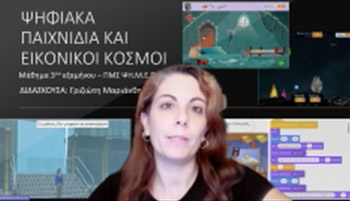| Semester: | 3rd | Course Tutors: | Δρ Γιαννούτσου Νικολέτα | |
| Group: | 1 | |||
| Category: | Elective Courses | See the detailed Course Outline (pdf) | ||
| ECTS: | 7 | Presentation: |  |
Digital Games and Virtual Worlds
COURSE CONTENT
- Digital Games and Learning:
- Basic Concepts: Game-based learning, digital games, virtual worlds
- Educational digital games vs. Gamification
- Core elements of virtual worlds – Example: Minecraft (software presentation)
- DESIGN: Initial brainstorming for designing a game
- Playing vs. Designing Digital Games:
- Game design by educators for students to play (learning through play)
– How to design a "good" educational game
– Design stages – The importance of mockups/storyboards and rapid prototyping
– Designing a meaningful gaming experience
– Approaches to integrating learning into games (intrinsic/extrinsic, closed/open structure, synchronous/asynchronous) - Game design by students – Connecting with learning theory through creation. Examples of best practices
- Game design platforms Scratch and Alice
- Other game design platforms (e.g., ARIS Games, Gamestar Mechanics, Twine) – key features – comparison
- DESIGN: Introduction to Scratch and Alice design platforms. Students attempt to transfer their game ideas to one of the two platforms presented – refining and enhancing the original concept
- Game design by educators for students to play (learning through play)
- Modifying Digital Games:
- Game modification – definition and player practices
- Game modification and learning
- DESIGN – Discussion: each student discusses the evolution of their idea, implementation challenges, and ways to encourage students to alter the game
- Half-Baked Games: A Pedagogical Approach to Game Modification:
- What are "half-baked" games
- Analyzing a half-baked game – pedagogical design – characteristics
- Modifying a half-baked game – recording the learning process
- Ideas for creating a half-baked game
- DESIGN – Discussion: each student discusses their idea’s progress and issues faced. After the discussion, they refine the initial concept and explore how to “half-bake” their game
- Categories of Digital Games:
- Massively Multiplayer Online Role-Playing Games (MMOs)
- Adventure and puzzle games (text-based adventures, interactive movies)
- Ubiquitous computing games (RPGs)
- Simulation games
- Strategy games
- Constructionist games
- Core concepts: Narrative, Ludology, Procedural Rhetoric, Immersion, and Adjuncts
- DESIGN – Discussion: each student discusses the progress of their idea, challenges, and the educational value of the game, with time at the end to enhance the game description
- Analysis of Digital Games:
- Basic game mechanics – Examples
- Game rules
- The concept of game balance
- What makes a game a game?
- Digital games and concept representation
- DESIGN – Discussion: each student discusses their idea’s development and challenges. Emphasis on the educational value of the game, with time at the end to refine the game description


